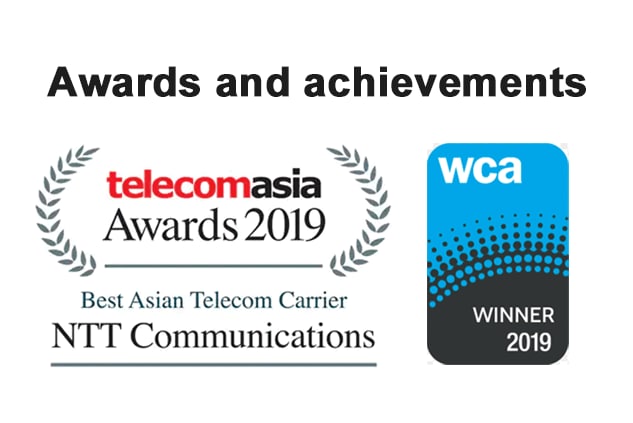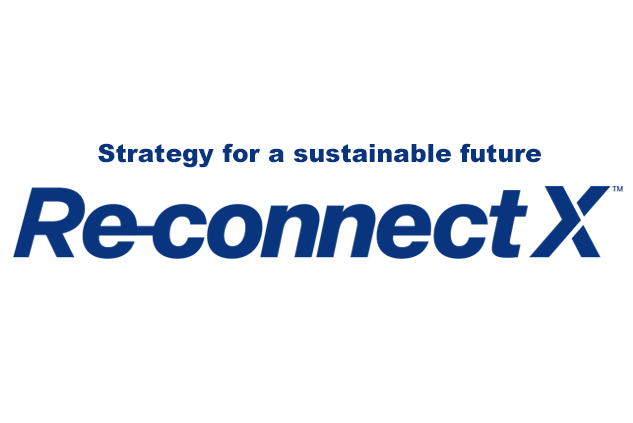Dialogue 2017
The NTT Communications Group is creating opportunities to conduct discussions with various stakeholders, with the view to engaging in a dialogue that facilitates closer communication.

Focusing on Sustainable Future, Promoting All-Employee CSR Participation

In Society’s interest in the United Nations Sustainable Development Goals (SDGs), the common goals that the whole world is tackling toward a better future, is transcending national borders and organizations and rising with every passing day. Since updating our CSR medium-term targets in 2016, we have been focusing on their significance and working on a range of SDG-based activities. As we did last year, we invited CSO (Civil Society Organization) Network Japan Executive Director Kaori Kuroda to give us her views on the significance of CSR and her expectations for the future.
SDGs That Have Become Social Buzzwords
- Kuroda:
- Thank you for once again kindly giving me the opportunity to meet and talk with you. Last time, I was reminded of the importance of SDGs, I am reminded that, last time, we mentioned the significance of the SDGs and emphasized the promotion of activities geared toward them.

- Tanaka:
- Ms. Kuroda, I am very pleased to be able to report the year’s results to you. Using your advice and suggestions, I was able to promote initiatives at an early stage. On a daily basis, I am keenly aware that, over the past year, there have been major changes in how the world is coming to grips with the SDGs. For example, a year ago the impression was that you only ever heard about SDGs at meetings on CSR. Last year, however, I think that they have become a hot topic for discussion from a number of angles even at general business meetings that do not directly address CSR matters. Ms. Kuroda, how do you perceive this change over the past year?
- Kuroda:
- I also feel that the interest of all in society has been rapidly increasing over this past year. Just the other day, I was invited to a junior high school teachers’ meeting and had the opportunity to speak with them. I was greatly impressed by how everyone earnestly discussed how best to gain an understanding of and teach about the SDGs. Including the active interest shown by mainstream investors who had previously been unfamiliar with SDGs, the changing tides are also evident at meetings with investors. It seems that, in certain pockets of society, there is an ongoing and gathering momentum, akin to a peaceful undercurrent, to think about and take action for a sustainable future.
- Tanaka:
- You’re right. I’m afraid that it’s only my personal opinion, but it is my belief that a number of conditions, including technological innovation, a radical change in awareness, and the implementation of financing, are necessary to bring about a situation in which society will change. Above all else, a radical change in awareness can be said to be a necessary condition for making social development better and more sustainable. A response to the bewildering progress made in both industry and finance, might not the 17 goals set out under the SDGs indicate the conditions for the awareness to make those goals useful for the future of a sustainable human race? Or, to put it another way, might they not show the ethics required of a world citizen?
- Kuroda:
- I feel the same way. I therefore think that SDGs are continuing to become common buzzwords for society, transcending national, ethnic and cultural boundaries. SDGs are once again raising an awareness that takes in the bigger picture, such as in the tide of globalization, which might be apt to lapse into an overemphasis on efficiency, in respect for human beings and in the maintenance of ecosystems. In the case of corporations, we are bringing about radical changes of awareness not only in business activities but also with regard to CSR by encouraging actions that balance value creation with fairness and compliance. These changes and the revised edition of the Japan Business Federation (Keidanren)’s Charter of Corporate Behavior, which was published in November 2017, have also led to a will to remain strongly aware of contributions to the SDGs.

- Tanaka:
- Representing common goals for the whole world, the SDGs hold great significance for corporate CSR activities. It is important to practice “CSR that makes the best use of a company’s individuality and characteristics,” but that should not be a goal in itself. However, it is also important to practice CSR that makes the best use of a company’s individuality and characteristics while remaining mindful of an awareness of bigger issues and of the issues that can be universally shared as a means of implementing CSR. As a result, shouldn’t the building of CSR activities from a more global perspective be encouraged? The NTT Communications Group’s CSR policy is being carried out pursuant to these kinds of ideas.
Back to top
Focusing on SDGs, Continuing to Evolve from Global Perspective, Our CSR Activities
- Kuroda:
- Finally, I’d like to advance my viewpoints on your company’s CSR activities. Fiscal 2016 was the first year of activities that were in line with the new CSR medium-term targets, but how were the results?
- Tanaka:
- Having received your advice, it was above all very meaningful that we were able to relate each SDG to each CSR activity priority area and commence activities. Having conducted a year’s activities, we are currently measuring their effects while further exploring the possibilities of expanding the activities and, at the same time, beginning to verify their quantitative and qualitative impacts on the medium-term targets.
- Kuroda:
- Even at meetings with CSR practitioners, I have received outlines from time to time. You seem to have achieved a variety of results. Among them, can you outline the initiatives that you, in your position as executive director, felt were particularly significant?

- Tanaka:
- First of all, there is the artificial intelligence (AI) COTOHA Series communications engine that entered service in 2016. Our CSR priority area “Contributions to Society,” mentions Goal 9, “Build resilient infrastructure, promote sustainable industrialization and foster innovation,” one of the relevant SDGs. For example, currently in Japan, there is an ongoing manpower shortage among the younger generation due to the declining birthrate and aging society. Improving labor productivity in the service industries remains a perennial problem from the viewpoint of maintaining and improving industrial competitiveness. For some time, we have been conducting ongoing research into AI technologies as a possibility for reforming social infrastructure through ICT innovation, and COTOHA is one of those technologies. At this time, at contact centers and other facilities, we have launched a service that responds to routine inquiries during customer interactions. The service has already been adopted by several customers, including OCN. On the subject of AI, in addition to being able to start responding immediately to customer inquiries 24 hours a day, 365 days a year, since we are able to concentrate human resources on more complicated response tasks, we are contributing to the resolving of issues that are difficult to manage together, such as improving the working environment of the workers at contact centers and improving customer satisfaction

- Kuroda:
- For a major global ICT company like NTT Communications, Goal 9 can play a major role. Through expansion of language engines and other means, I am expecting a broadening of the locations of further activities, such as store customer contact points and in interpreting.
- Tanaka:
- What I would like to outline next is a process to cut carbon emissions from data centers. Today, the roles that data centers fulfill are continuing to increase, but one of them is their contribution to the reduction of carbon in society. Research results have shown that energy efficiency will increase by about 20% by consolidating them among data center operators like NTT Communications rather than with individual companies that possess servers. The effect will be further increased by thoroughly cutting our data center emissions by quantitative means. We have painstakingly developed low carbon emission “kaizen” (improvement) activities, naturally not only for our newly established facilities throughout the world but also for our existing facilities, and fiscal 2016 was a year in which those initiatives produced steady results.
- Kuroda:
- Your company is deeply involved in its CSR priority area of “Contributions to the Global Environment” and in Goal 13 of the SDGs, “Take urgent action to combat climate change and its impacts.” As specific action on a global scale, such as the One Planet Summit held in Paris in December 2017, is currently being advocated, the challenges your company is facing are from a global point of view, and I feel that significance is great.
- Tanaka:
- The third initiative involves our efforts with suppliers. Based on the views I received from you during our previous dialogue, I accelerated those efforts. Touched on occasionally by the management team, I have explained the coming of an era in which “who you buy from” is respected and promoted assessments and other initiatives on a global basis to not only have our company practice fair business behavior but also to bear that in mind when selecting suppliers and prevent human rights abuses. Including the significance of their accountability, we record information on the EcoVadis worldwide supplier information platform and accordingly receive CSR evaluations; we received a silver evaluation. Besides these, we have realized various achievements, such as human resource utilization and security measures. As we describe these in detail in our CSR Report, we would greatly appreciate it if you were to refer to them.

- Kuroda:
- Exercising responsibility that focuses on the supply chain is a fundamental element of CSR activities, and even SDGs can be said to be important issues involving multiple goals. Expectations of accountability from stakeholders are currently on the increase, and the proportion of Japanese companies that are receiving surveys of supplier information platforms and others remains as low as it ever was, but your company’s proactive efforts can be said to set a fine example in focusing on global standards.
- Tanaka:
- Just as you pointed out, we believe that “global standard” is rapidly gaining in importance as a buzzword for CSR activities and information disclosure. We have also positioned the strengthening of our initiatives in 2018 along those lines. All NTT Communications Group employees will continue to face the challenges, so that we can again outline the results to you next time.

Back to top
Kaori Kuroda, Executive Director of CSO Network Japan After working for a private company, Ms. Kuroda worked at the Columbia Business School Center on Japanese Economy and Business and the Asia Foundation Japan in the United States. She has been in her current position with CSO Network Japan since 2004. |
Back to top

 EN
EN






